Former Bishops
First Bishop of Salford
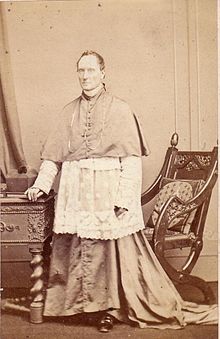 Born near Preston in 1799, William Turner went to the English College in Rome in 1820. He was a fellow student there with Nicholas Wiseman, who later became the first Archbishop of Westminster. Returning to Lancashire in 1826, his ministry encompassed the poor parishes in central Manchester, exploding at that time thanks to the industrial revolution. He was a member of the Old Chapter and became Vicar General to the Bishop of the Lancashire District, Dr Brown.
Born near Preston in 1799, William Turner went to the English College in Rome in 1820. He was a fellow student there with Nicholas Wiseman, who later became the first Archbishop of Westminster. Returning to Lancashire in 1826, his ministry encompassed the poor parishes in central Manchester, exploding at that time thanks to the industrial revolution. He was a member of the Old Chapter and became Vicar General to the Bishop of the Lancashire District, Dr Brown.
William Turner was consecrated first Bishop of Salford by Cardinal Wiseman on 25th July 1851.
Bishop Turner had to contend with pressures caused by the Irish potato famine of the 1840s and the American cotton famine of the 1860s. He lost a tenth of his clergy through fever contracted during their service of the sick. Even so, he increased the number of parishes from 30 to 70 during his time of office. He promoted Catholic education at primary and secondary level. He introduced the Xaverian Brothers in 1854 and founded the Salford Catholic Grammar School in 1862. During his episcopate the female teaching orders of Loreto and the Faithful Companions of Jesus also came to the Diocese, the Sisters of the Cross and Passion were founded, and with Alice Ingham of Rochdale he laid the foundations for the future Congregation of the Franciscan Missionaries of St Joseph. Bishop Turner attended the first Vatican Council (1869-1870), though ill-health forced him to return to England before the Council ended. He died in office at Salford on 12th July 1872.
Second Bishop of Salford
At 40 years of age Herbert Alfred Henry Joseph Thomas Vaughan (1832–1903) was the youngest bishop ever to be appointed in Salford. He was a man of fine presence and simple but deep spirituality.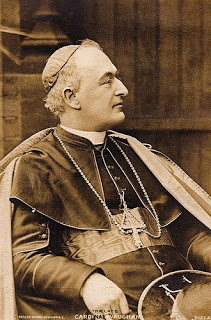
Herbert Vaughan was born at Gloucester, of an old Catholic recusant family, the Vaughans of Courtfield, Herefordshire. His mother, Eliza Rolls, was a Catholic convert and intensely religious. All five of the Vaughan daughters became nuns, while six of the eight sons became priests. Three were later bishops: Herbert, Roger (Archbishop of Sydney) and John (auxiliary bishop in Salford).
Herbert studied with the Jesuits at Stonyhurst College in Lancashire and at Brugelette in Belgium, then with the Benedictines at Downside Abbey. In 1851 he went to Rome and studied for two years at the Accademia dei Nobili Ecclesiastici. Henry Edward Manning, later Cardinal Archbishop of Westminster, was a fellow student. Manning had much influence on Herbert Vaughan’s spiritual development and later career. With special dispensation because of fears for his health, Herbert was ordained priest at Lucca in 1854 at the age of 22.
On returning to England, he became Vice-Rector of St Edmund’s College, Ware, at that time the chief seminary in the south of England. He travelled widely in Europe and the Americas. In 1866 he founded the St Joseph’s Foreign Missionary College, usually known as Mill Hill. In 1871 Vaughan went to the United States to form a mission society whose purpose was to minister to freed slaves. In 1893 the society was reorganized to form the US-based Josephite Society. Among its founders was the first African-American Catholic priest trained and ordained in the US. In 1868 Vaughan had started the Catholic Truth Society and in the same year bought and edited the Tablet, using its columns to spread the message of the Gospel. On arrival at Salford therefore he already had an impressive record of achievements.
Bishop Vaughan’s 20 years in Salford were years of intense activity. He founded more than 40 new missions. He established a Seminary of Pastoral Theology, attached to the Cathedral, where young priests whom he recruited from England, Ireland, Holland, Belgium and Germany resided for their first year. He founded St Bede’s College in Manchester, started the Catholic Children’s Rescue and Protection Society and in 1883 established with Alice Ingham the Congregation of the Franciscan Missionaries of St Joseph. He also re-established the Catholic Truth Society. He entered fully into the life of the civic community where he was a familiar figure at the Board of the Chamber of Commerce and co-founder of the Manchester Geographical Society. He became Archbishop of Westminster in 1892 and Cardinal the following year. There he was responsible for the building of Westminster Cathedral. The Cathedral opened with his Requiem Mass in June 1903.
Third Bishop of Salford
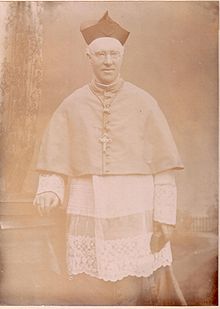 John Bilsborrow was rector of Upholland College when he was named as Bishop of Salford. He came from Lancashire yeoman stock that had kept the Catholic faith through penal times. He was born at Singleton Lodge in the Fylde on 30 March 1836. Ordained priest in 1865, he was sent to Barrow-in-Furness to establish the new mission there. In 1883 he was appointed to the newly opened seminary of St Joseph at Upholland, near Wigan. There he taught dogmatic, moral and ascetic theology.
John Bilsborrow was rector of Upholland College when he was named as Bishop of Salford. He came from Lancashire yeoman stock that had kept the Catholic faith through penal times. He was born at Singleton Lodge in the Fylde on 30 March 1836. Ordained priest in 1865, he was sent to Barrow-in-Furness to establish the new mission there. In 1883 he was appointed to the newly opened seminary of St Joseph at Upholland, near Wigan. There he taught dogmatic, moral and ascetic theology.
Bishop Bilsborrow was a strong advocate of voluntary schools, for whose existence there was an intense struggle, culminating in the victory of the Education Act of 1902. During his episcopate, Catholics in the diocese of Salford increased from 217,000 to 270,000. He founded 12 new missions. He took a keen interest in the education of his future priests and transformed the Ecclesiastical Education Council to increase the number of poor boys to receive a higher education and then become students for the priesthood. He was known as a friend of the clergy and the poor.
Dogged by poor health during most of his term of office, he died at Babbicombe in Devon in March 1903.
Fourth Bishop of Salford
Joseph Casartelli came to Manchester in 1834 from Tavernerio near Lake Como. He was a skilled scientific instrument maker and optician who ran a successful business. His more famous son, Louis Charles Casartelli, was born in Cheetham Hill on 14th November 1851. Louis was one of the first students at the Salford 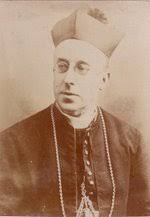 Catholic Grammar School begun by Bishop Turner and became fluent in French, German, Italian and Spanish. He went to Ushaw College, Durham, earning his MA degree from London University and the gold medal for Classics. In 1874 he began his studies at the University of Louvain, in Belgium, where he specialised in Oriental languages. He later became a recognized authority on Zoroastrianism.
Catholic Grammar School begun by Bishop Turner and became fluent in French, German, Italian and Spanish. He went to Ushaw College, Durham, earning his MA degree from London University and the gold medal for Classics. In 1874 he began his studies at the University of Louvain, in Belgium, where he specialised in Oriental languages. He later became a recognized authority on Zoroastrianism.
Ordained priest by Bishop Vaughan in 1876, he completed his studies at Louvain and in 1877 was appointed professor and Prefect of Studies at St Bede’s College, Manchester. In 1884 he returned to Louvain and became a Doctor of Oriental Literature. Resuming his post at St Bede’s, he succeeded as Rector in 1891.
He lectured in Oriental languages at Louvain and at the University of Manchester. In 1892 he was one of the founders of the Manchester branch of the Catholic Truth Society and took a special interest in its work.
When appointed Bishop of Salford in 1903, he shrank from the post and wrote to the Holy See begging to be excused. His appeal was rejected. As a scholar of international repute, he found the work of administration uncongenial but conscientiously fulfilled his many tasks as bishop. He was always the kind father and patron as he did the round of parishes, schools and convents. He continued to live at St Bede’s, keeping in close touch with his students and their professors.
Bishop Casartelli set out his stall with his first Pastoral Letter entitled ‘The Signs of the Times’, written a month after his consecration. He urged Catholic laymen “to go forth to all the interests of the commonwealth of which we are part”, going on to say that he wanted the laity to play their role “…in matters social, municipal, philanthropic, educational, artistic, literary in which we may use the powers we enjoy”.
In 1906 a Liberal Government, which pledged to abolish voluntary (including Catholic) schools, was returned with a massive majority. Bishop Casartelli formed the Catholic Federation to fight this. In 1908, and with the active encouragement of the bishop, a number of the Federation’s leading lights became the founder members of The Chums Benevolent Association. Two years later, the title was changed to the Catenian Association, now active in Europe, Africa and Australia.
In a monthly journal, The Federationist, Bishop Casartelli continued to address many questions of public life. He took an active part in civic life and saw Aldermen McCabe and Fox become the first Catholic Lord Mayors of Manchester. He founded the Manchester Dante Society, was President of the Manchester Egyptian Association and the Statistical Society, and supported the Oriental, Geographical, Antiquarian and other Societies. He was elected an Honorary Member of the Royal Asiatic Society of Great Britain and Ireland. His scholarly reputation brought prestige to the whole Catholic body.
Bishop Casartelli died in office at Cathedral House, Salford, on 18th January 1925.
Fifth Bishop of Salford
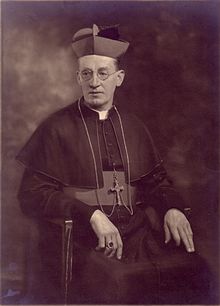 Thomas Henshaw was the second ‘home-produced’ Bishop in Salford. He was born in the famous parish of St Patrick’s, Collyhurst, on 2nd February 1873. Ordained priest in 1899 he taught at St Bede’s and Ushaw College, and served at Holy Saviour, Nelson, and St Gabriel’s, Castleton, before becoming parish priest at St Anne’s, Blackburn. Consecrated Bishop on 21st December 1925, he was described as a “pastorally minded and pragmatic parish priest with financial acumen and quiet scholarship”.
Thomas Henshaw was the second ‘home-produced’ Bishop in Salford. He was born in the famous parish of St Patrick’s, Collyhurst, on 2nd February 1873. Ordained priest in 1899 he taught at St Bede’s and Ushaw College, and served at Holy Saviour, Nelson, and St Gabriel’s, Castleton, before becoming parish priest at St Anne’s, Blackburn. Consecrated Bishop on 21st December 1925, he was described as a “pastorally minded and pragmatic parish priest with financial acumen and quiet scholarship”.
Popular with his priests, he at once faced a crisis through a shortage of priests, brought on by a series of untimely deaths. He went around the Diocese preaching on the need for priests. So many men responded that in the 1930s they could not be accommodated within the Diocese and had to be loaned out until vacancies occurred.
But it was education that focussed much of Henshaw’s mind. The ongoing struggles between those in the country opposed to the Dual System – whether in central or local Government or in the Trades Unions and elsewhere – and those in the Churches in favour of that system occupied much time and effort. Bishop Henshaw indefatigably defended the rights of parents and responded to the challenges of the times, made even more difficult by the demands of the 1936 Education Act. He encouraged the building of elementary schools and supported the development of colleges such as De la Salle in Salford, Thornleigh in Bolton, and the Marist College in Blackburn. He also greatly extended St Bede’s College in Manchester and supervised the extension of the Children’s Rescue Home in Didsbury. He formed 15 new parishes and saw 41 new churches built. Lay societies came into the Diocese, including the Legion of Mary and Young Christian Workers.
In 1930 the Diocese bought Wardley Hall and its estate. The Hall became the bishop’s residence and the land was developed as St Mary’s Cemetery, Wardley. There Bishop Henshaw was laid to rest after his death at Wardley Hall on 23rd September 1938.
Sixth Bishop of Salford
The only Irish born Bishop of Salford was Henry Vincent Marshall, born in Listowel, County Kerry, on 19th July 1884. Ordained priest in 1908, he held various posts in the diocese of Salford before becoming parish priest of St Anne’s, Ancoats, and Vicar General to Bishop Henshaw. His consecration as bishop came at a difficult time, on 21st September 1939, just as the Second World War was beginning. 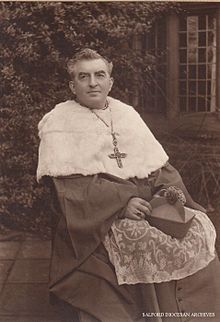
The war years and their immediate aftermath brought about many changes in the Diocese. Forty-five Salford priests served as chaplains to the Armed Forces. Several churches and schools were bombed, with priests and people killed and injured. There were shortages of food and other goods, building restrictions and high prices. Post-war slum clearance and the creation of overspill estates brought new problems, with the need for new parishes and schools. The 1944 Education Act placed huge financial burdens on the Catholic people.
Bishop Marshall responded with a campaign to renew the spiritual life of the Christian home by a crusade of family prayer. He prepared a course of instruction covering five years to be given at Mass. In 1948 he restored the traditional Whit Friday Procession in Manchester and Salford which had been discontinued during the War. He started the ‘Schools Emergency Fund’ and a central banking system, sharing the resources of all the parishes in the diocese to help the new ones struggling with debt. The Fund still operates today.
Like his predecessors, Marshall fought the cause of the rights of parents to give their children a Catholic education. He lived up to his motto, Miles Christi Sum (I am a Soldier of Christ), putting the Catholic cause before the general public with energy and courage, with backing from the Catholic Parents and Electors Association. With the Brothers of Christian Instruction, he strongly supported the opening in 1947 of a training college for Catholic men teachers at Hopwood Hall, Middleton. The college, later merged with Sedgley Park College, produced generations of teachers until it closed in 1989.
Bishop Marshall died in St Joseph’s Hospital, Whalley Range, on 14th April 1955. He is buried in St Joseph’s Cemetery, Moston.
Seventh Bishop of Salford
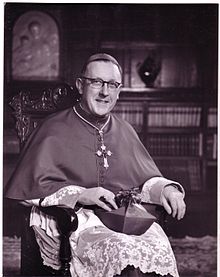 George Andrew Beck’s nine years in Salford mark the shortest tenure of office of any of the Bishops of Salford. His appointment – unusual in that he was already an Ordinary in Brentwood – was probably influenced by the importance that the See of Salford enjoyed in Catholic educational circles. Beck was the Catholic Bishops’ representative with central Government on education. Officials there acknowledged that he often knew the law better than they did themselves. He successfully led negotiations to better the position of Catholic schools across the country.
George Andrew Beck’s nine years in Salford mark the shortest tenure of office of any of the Bishops of Salford. His appointment – unusual in that he was already an Ordinary in Brentwood – was probably influenced by the importance that the See of Salford enjoyed in Catholic educational circles. Beck was the Catholic Bishops’ representative with central Government on education. Officials there acknowledged that he often knew the law better than they did themselves. He successfully led negotiations to better the position of Catholic schools across the country.
Born in Streatham, London, on 28th May 1904, George Andrew was educated at Clapham College and at the Assumptionist College of St Michael at Hitchin in Hertfordshire. He joined the Augustinians of the Assumption and was ordained priest in 1927. From being Headmaster of the Becket School in Nottingham, in 1948 he became coadjutor bishop of Brentwood, succeeding Bishop Doubleday there in 1951.
Transferred to Salford in 1955 he continued Bishop Marshall’s expansion of parishes and schools. He was involved in preparations for the second Vatican Council, with particular concern for the means of social communication, and attended all sessions of the Council from 1962 to 1965. In 1964 he was appointed Archbishop of Liverpool where he remained until his retirement through ill-health in 1976. He died in retirement on 13th September 1978.
Eight Bishop of Salford
The Second Vatican Council (1962-1965) with its post-conciliar documents inspired the episcopate of Thomas Holland. He attended all four sessions and returned from the Council with one main purpose:
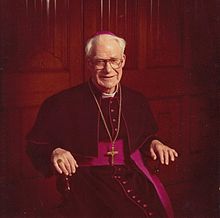 “What I would most wish to see is one single family, one community, all consciously united in the bonds of truth and love. This is the point to which my efforts will be directed.”
“What I would most wish to see is one single family, one community, all consciously united in the bonds of truth and love. This is the point to which my efforts will be directed.”
Following the Council, he oversaw the provision of new structures in the Diocese in the fields of liturgy, ecumenism, education, social welfare, missionary activity at home and abroad, the deaf apostolate. It was a time of intense activity, with Bishop Holland involved in England especially with the Bishops’ Ecumenical and Mass Media Commissions and abroad in the Vatican Secretariats for Promoting Christian Unity and for Non-Believers and the Joint Working Group of the Catholic Church and the World Council of Churches. He gave a vigorous lead on pro-life issues and shared prominently in the civic life of the cities and towns of the Diocese. The University of Salford made him an honorary Doctor of Letters in 1980.
Thomas Holland came to the diocese from Portsmouth. He had been coadjutor bishop there since 1960. He welcomed the fact that he was coming home to Lancashire. Born in Southport on 11th June 1908, he studied at Upholland College, Wigan, and the English College, Valladolid. He was ordained priest on 18th June 1933. After a short time as curate in Liverpool he went to the Beda College in Rome and took his Doctorate in Theology at the Pontifical Gregorian University. His thesis on the action of the Holy Spirit in non-Catholic Churches cut new ground and won him the gold medal in theology. He taught dogmatic theology and other disciplines at the English College, Valladolid, and the English College, Lisbon, between 1936 and1943. A naval chaplain from 1943 to 1946, he was awarded a DSC for services in the Normandy landings. From 1946 to 1948 he was port chaplain in Bombay, India. Returning to England he was a member of the Catholic Missionary Society based in London from 1948 to 1956, before becoming secretary to Archbishop Gerald O’Hara at the Apostolic Delegation in Wimbledon, London, from where he received his appointment to Portsmouth.
The highlight of his episcopate was the visit of Saint John Paul II to the diocese in 1982. The Holy Father said Mass and ordained priests in Heaton Park, Manchester, before an immense crowd. Bishop Holland retired as Bishop in June 1983 but remained as Apostolic Administrator until his successor came in April 1984. In retirement he lived in Nazareth House, Prestwich. He died on 30th September 1999.
Ninth Bishop of Salford
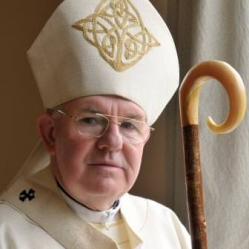 Another Lancastrian followed Bishop Thomas Holland. Patrick Altham Kelly was born in Morecambe, Lancashire on 23rd November 1938, the first son of John and Mary Kelly. His father, originally from Donegal, was a local dentist. Patrick attended St Mary’s Primary School, Morecambe and the Jesuit Preston Catholic College, before commencing studies for the priesthood in Rome in 1955.
Another Lancastrian followed Bishop Thomas Holland. Patrick Altham Kelly was born in Morecambe, Lancashire on 23rd November 1938, the first son of John and Mary Kelly. His father, originally from Donegal, was a local dentist. Patrick attended St Mary’s Primary School, Morecambe and the Jesuit Preston Catholic College, before commencing studies for the priesthood in Rome in 1955.
Patrick Kelly was ordained by Cardinal William Godfrey at the English College, Rome on 18th February 1962. He remained in Rome for postgraduate studies until 1964.
On returning to England he served as assistant priest at St Peter’s Cathedral, Lancaster until his appointment as a lecturer in theology on the staff of St Mary’s College, Oscott, Birmingham in 1966. He became Rector of Oscott in 1979 and continued in the post until his appointment to Salford. Bishop Holland, assisted by Archbishops Worlock and Couve de Murville, ordained him as Bishop of Salford on 3rd April 1984.
Bishop Kelly re-ordered St John’s Cathedral and restored the order of the sacraments of Baptism, Confirmation and Eucharist by introducing a new sacramental programme into the diocese. Henceforth, children were confirmed before receiving their first Holy Communion. He took particular interest in the mission to deaf people and encouraged the foundation, with the Franciscan Missionaries of St Joseph and others, of Francis House Children’s Hospice, officially opened by the late Princess Diana in 1991.
Bishop Kelly was translated to Liverpool on 21st May 1996 and installed as Archbishop on 3rd July 1996.
Tenth Bishop of Salford
Bishop Terence Brain was born in Coventry on 19th December 1938. 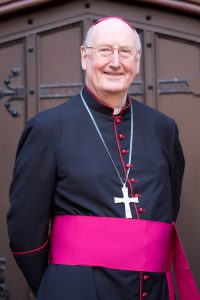
His father was a master carpenter and joiner. He was educated at King Henry VIII Grammar School and Cotton College before training for the priesthood at Oscott College, Sutton Coldfield. He was ordained priest by Archbishop Grimshaw in St Chad’s Cathedral, Birmingham on 22nd February 1964.
Father Brain was appointed first as an assistant priest in Longton, Staffordshire (1964 to 1965) but a year later returned to Cotton College where he remained on the staff for four years (1965 to 1969). For two years he worked as chaplain at Dudley Road Hospital, Birmingham (1969 to 1971) and from 1971 to 1982 served as secretary to Archbishop Dwyer until his retirement, and then for a short time to Archbishop Couve de Murville.
Monsignor Brain served as parish priest at St Maria Goretti’s, Bucknall, near Stoke-on-Trent, from 1982 to 1988. From 1988 to 1991 he served as parish priest at St Austin’s, Stafford. He was also a Schools Commissioner and Director of the Birmingham Lourdes Pilgrimage.
Monsignor Brain was ordained as Auxiliary Bishop of Birmingham on 25th April 1991. He took as his own the family motto, Porthair Arglwydd y Brain, meaning “God feeds the crows”.
Bishop Brain was appointed tenth Bishop of Salford on 2nd September 1997 and installed on 7th October 1997. He began a diocesan programme “Faith in the Future” aiming to serve and equip the Diocese for future needs. He reorganised structures in the diocese by forming Departments for Administration, Evangelisation, Formation and Vocation – each headed by an Episcopal Vicar. He made the decision to bring all central services together in the Cathedral Centre adjoining St John’s Cathedral.
In 2010 Bishop Brain created Caritas, Diocese of Salford bring together a number of diocesan welfare and social responsibility projects together under one umbrella organisation.
Bishop Brain retired in 2014 and still resides in the Diocese.
Bishop John Vaughan 1909 - 1925
John Vaughan was born on 24th January 1853, the youngest of the thirteen children of Herbert and Eliza 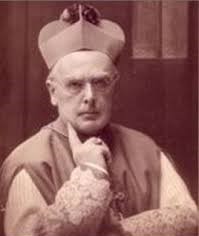 Vaughan. He was ordained priest by his brother, Bishop Herbert Vaughan, on 4th June 1876 in St John’s Cathedral, Salford. He was one of the first professors at the newly-opened St Bede’s College, but his health failed and he was ordered abroad. For some years his priestly ministry alternated between Rome and Westminster. In Rome he was attached to San Silvestro in Capite, a church frequented by English residents in Rome.
Vaughan. He was ordained priest by his brother, Bishop Herbert Vaughan, on 4th June 1876 in St John’s Cathedral, Salford. He was one of the first professors at the newly-opened St Bede’s College, but his health failed and he was ordered abroad. For some years his priestly ministry alternated between Rome and Westminster. In Rome he was attached to San Silvestro in Capite, a church frequented by English residents in Rome.
Pope Leo XIII made Bishop Vaughan a Domestic Prelate in 1898. Pope St Pius X appointed him auxiliary Bishop of Salford and titular Bishop of Sebastopolis in Cappadocia, Asia Minor, in 1909 to assist Bishop Casartelli.
Bishop Vaughan resided first with the Xaverian Brothers. Then, from 1912 to 1915, he was rector of St Bede’s College. After a time at Upholland and elsewhere he became in 1920 parish priest of Our Lady and St Hubert, Great Harwood. He survived Bishop Casartelli only by a few months. He died on 4th December 1925 and is buried at Great Harwood.
Bishop Geoffrey Burke 1967 - 1988
Geoffrey Burke was born in Manchester on 31st July 1913. His father was a well-loved and respected family doctor in Hulme. Geoffrey studied at St Bede’s College, Manchester, and at Stonyhurst College before training for the priesthood at Oscott College, Birmingham. He was ordained priest on 29th June 1937 and took an MA in History at Downing College, Cambridge, in 1940. He was at St Bede’s College from 1940 until 1967, becoming in turn professor, Headmaster and Rector.
Appointed auxiliary Bishop of Salford and titular Bishop of Vagrauta, he was consecrated by Bishop Holland on 29th June 1967. He resided at Cathedral House in Salford and took a very active role in the administration and work of the diocese. He retired on 31st July 1988 and lived briefly at Nazareth House, Prestwich, before going to the Little Sisters Home in Longsight. He died on 13th October 1999, just two weeks after Bishop Holland, and is buried in St Mary’s Cemetery, Wardley.
